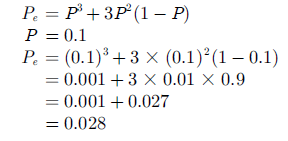Q.59 A digital communication system uses a repetition code for channel encoding/decoding. During transmission, each bit is repeated three times (0 is transmitted as 000, and 1 is transmitted as 111). It is assumed that the source puts out symbols independently and with equal probability. The decoder operates as follows: In a block of three received bits, if the number of zeros exceeds the number of ones, the decoder decides in favor of a 0, and if the number of ones exceeds the number of zeros, the decoder decides in favor of a 1, Assuming a binary symmetric channel with crossover probability p = 0.1, the average probability of error is _____.
Answer: (0.028)
Explanation:













